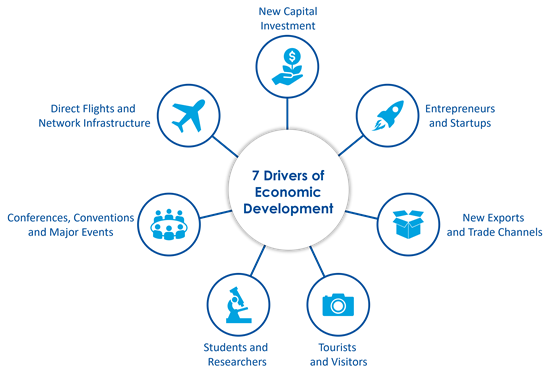Economic development agencies often struggle to communicate tangible value to their community and stakeholders. These municipal organizations fill their weeks, months, and years with important activity but often fail to demonstrate definitive outcomes that can be solely attributed to their work.
And for that they are easily criticized.
Credibility and relevance are continually tested throughout the political, economic, and relationship cycles that exist between the agency and the municipality, as well as with the many adjacent organizations that comprise the economic development ecosystem.
This article highlights a proven approach to communicating the value of economic development agencies – one that is grounded in real-time data, reporting transparency, and performance outcomes that matter – all with the goal of building higher performing ecosystems and more economically sustainable municipalities.
Making the Scoreboard Visible
As the former CEO of Edmonton Economic Development Corp. (2012-2018) serving under Mayor Stephen Mandel, my phone used to ring every Thursday morning. It was the Mayor, and he would ask me one simple question:
“How is my city doing?”
I dreaded the call. It seemed like such a straight-forward question. In fact, it was absolutely the right question to ask. But it was also a persistently difficult question to answer … until our team unlocked the formula.
Looking back, that weekly phone call was a gift, as it helped align the interest and activities of our team to the metrics that mattered.
I called our executive team into my office and explained that when the phone rings and the Mayor asks his weekly question, I want to be able to look up at a TV screen on my wall and read off a series of real-time data points, similar to a stock ticker, to tell him how his “portfolio” is doing. I wanted to be able to list off a series of data points, including:
- Number and value of building permits submitted
- GDP and changes in our employment rate by industry sector
- Hotel occupancy and number of visitors in town
- Number of new startups and money recently raised
- Number of investor groups or site selectors in town
- Volume of railcars exporting products
- Number of passengers flowing through our airport
- Attendance at our conferences and major events underway
- Attitude and engagement level of Edmontonians
Making the scoreboard visible, something not easy to do in the world of economic development, was a critical step that opened the door to a growth-oriented mindset and paved the way for greater accountability and greater ownership across the ecosystem. Private sector sales teams do it every day, so we set out to undertake the same.
Powering Municipalities to Win
We were lucky. The city had an integrated economic development model with responsibility for FDI (foreign direct investment), tourism, startups, conferences, conventions, and major events under a single entity. Nevertheless, the organization was also part of an ecosystem where we had to coordinate data from our partners from the International Airport, Colleges and Universities, City Departments, our Destination Marketing Organization, Hotel Operators, the Police Department, and the Real Estate community.
Although this was largely done with spreadsheets before the wide-scale adoption of Power BI and Tableau, we used our soft power to convene to create the open data set that allowed us to identify trends, forecast performance, identify gaps in our activities, and reallocate budget for highest impact.
Seven Drivers of Economic Development
What we uncovered through the process, is that there are seven drivers of economic development that truly matter. These are the creation or attraction of:
| 1. | New Capital Investment – the money that businesses and individuals invest in the communities’ businesses, technology, lands, and infrastructure to create new opportunities for the local economy to grow and prosper |
| 2. | Entrepreneurs and Startups – bringing innovative ideas to market that can lead to the creation of new industries and the growth of existing ones |
| 3. | New Exports and Trade Channels – the goods and services that a community sells to other jurisdictions and the new ways in which those goods and services are being traded |
| 4. | Tourists and Visitors – spending from non-local people on goods and services that support local businesses |
| 5. | Students and Researchers – creating a pipeline of localized talent that attract business and investments, and lead to new knowledge and discoveries |
| 6. | Conferences, Conventions and Major Events – raising the external profile of the community and attracting visitors who generate revenue for local businesses |
| 7. | Direct Flights and Network Infrastructure – making it easier and more convenient for people, goods, and ideas to move to and from the community leading to increased economic activity and investment |

These seven drivers bring new money into the city, accelerate the velocity of money within the city, increase the engagement of citizens, and propel the generation of new ideas, technologies, talent, success stories, wealth, and global rankings.
Making the scoreboard for these seven drivers public and amplifying the measures that matter through various media channels, creates a rhythm, an energy, a pulse and a winning mindset among citizens to the point where thousands of citizens become the municipality’s marketing department – true ambassadors of the brand.
Powerful stuff, especially as winning begets winning.
Size No Longer Matters
For municipalities below one million people, having an integrated economic development agency is a competitive advantage. It worked for Edmonton, responsible for a quarter of all net new jobs in the country from 2012-2018. And it is now working in other communities across Canada and around the world that are embracing this structural trend to sharpen a smaller municipality’s ability to compete.
Marketing is a leverage game and coordinating a self-reinforcing brand and promotion strategy across the many players in the municipal ecosystem is easier to do when there is one coordinating organization responsible for synthesizing the data, results, and stories from the seven economic development drivers.
For municipalities above one million people, the opportunity remains the same; however, the challenge is often complicated by established entities with independent brands, sprinkled with personalities and territories and histories. Smart economic development agencies are working with their municipal leaders to break down these systemic barriers, manage change, and increase competitiveness through the process.
Collaborating to compete is the winning formula; however, the change process starts with a unified scoreboard and a common desire to unlock the power of the seven drivers needed for a high-functioning ecosystem.
Optimus SBR’s Economic Development Practice
Our organization powers Canada’s top performing economic development agencies to win by:
- Designing competitive strategies
- Bringing coordination to the ecosystem
- Implementing attraction programs and playbooks
- Building winning narratives and brands
- Measuring what matters
Our team is one of the most experienced in the consulting industry, having built leading practices at the operational, management, and governance levels in municipal, regional, provincial, and federal economic development agencies.
Contact Us for more information on how we can assist your team.
Brad Ferguson, SVP, Industries and Government Practice
Brad.Ferguson@optimusssbr.com





Industry Insights
Service Insights
Case Studies
Company News